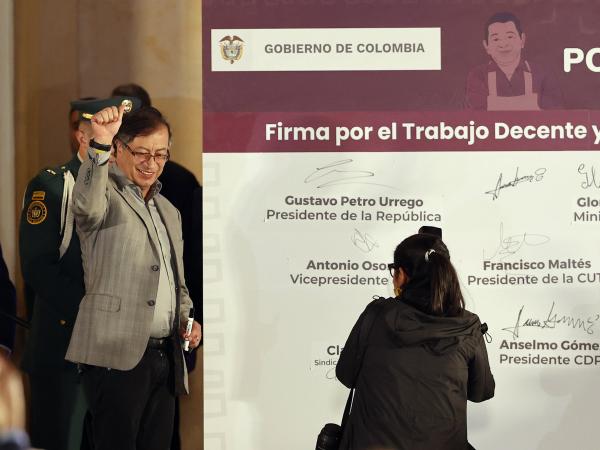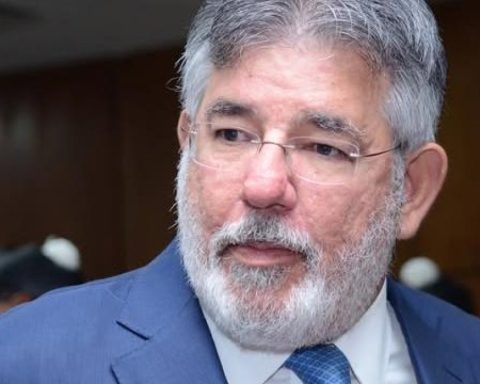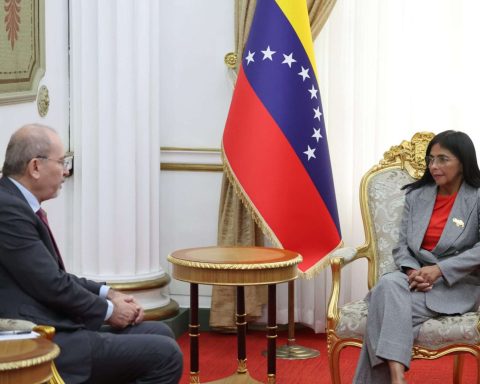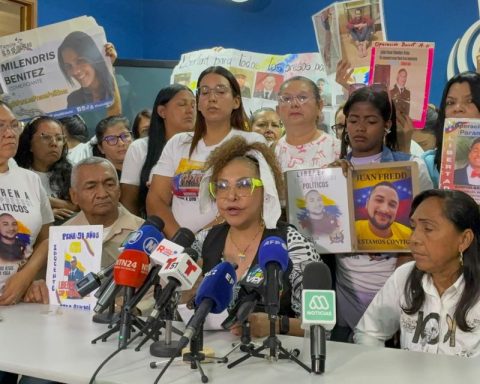The Vladimir Herzog Institute, the Arns Commission and the Nucleus for the Preservation of Political Memory held an act in memory of the 50th anniversary of the murder of student Alexandre Vannucchi Leme, who died during the Brazilian military dictatorship. The act, called Alexandre Vive! 50 Anos, took place at the USP Faculty of Law, in Largo São Francisco, in the center of São Paulo, and filled the Students’ Room.
In addition to the homage, the occasion also served to demand that the Brazilian authorities revise the Amnesty Law so that State agents responsible for deaths, torture and disappearances that occurred during the dictatorship can finally be punished for these crimes.
“We arrive 50 years after Alexandre’s death with many inconclusions about the circumstances that led him and thousands of other victims of the dictatorship to death, torture or forced disappearance. The main gap, 50 years later, is the issue of holding these perpetrators accountable,” said Gabrielle Abreu, coordinator of Memory, Truth and Justice at the Vladimir Herzog Institute.
the case
Alexandre Vannucchi Leme was only 22 years old and a Geology student at the University of São Paulo (USP), who had just had his appendix operated on, when he was arrested, tortured and killed by agents of the Information Operations Detachment – Center for Internal Defense Operations ( DOI-Codi) from São Paulo, an agency subordinate to the Army.
Born in Sorocaba, he was the son of teachers and was active in the National Liberation Action (ALN) at the time of his arrest. According to State Truth Commission, which took place at the Legislative Assembly of São Paulo, Leme was last seen on March 15, 1973, attending classes at USP. On March 16, he was arrested by DOI-Codi agents and subjected to intense torture sessions. A police investigation initiated at the time reported that he was arrested “to investigate subversive activities by the ALN”. The day after his arrest, Leme died as a result of torture.
In an interview today with EBC, Maria Cristina Vannucchi Leme, Alexandre’s middle sister, recalled the family’s anguish upon learning that he had been arrested. “We only found out that something had happened when he didn’t show up at the weekend in Sorocaba. We have birthdays in a row. We have sisters who have birthdays on the 21st, 24th and 26th [de março]. And on March 21, he did not come and did not call. That was very strange because he was always a very present brother. It was then that we received a call that he was under arrest. My father went down a sacred path looking for Alexandre. But we were looking for Alexandre alive. It never crossed our minds that he was already dead and buried as a pauper,” she said.
“The dictatorship was in a hurry to erase the traces of its crimes. So he was hastily buried, with the grave covered in lime to hasten decomposition. [do corpo]”, he completed.
In a statement given to the National Truth Commission in November 2012, Marival Chaves Dias do Canto, a former DOI-Codi employee admitted that Alexandre Vannucchi Leme was killed on the premises of that body. “Vannucchi, the story they tell at the DOI is that he was taken to the infirmary to apply a bandage, he took a razor blade and cut his wrist, that’s the version, but that’s not true. These people all died on the macaw stick, all under interrogation”. Before that, testimonies given by political prisoners in 1973 had already denied the version of suicide.
“Carlos Alberto Brilhante Ustra [comandante do DOI-Codi]whose nom de guerre was Major Tibiriçá, told me: ‘You’re from the Faculty of Geology [da USP]? I just sent the worm [como era conhecido o Alexandre Vannucchi Leme] to the Celestial Vanguard. I just killed that one [ele diz um palavrão] do Minhoca and that’s where I’m going to send you too”, said Adriano Diogo today, who was Vannucchi Leme’s college classmate and a political prisoner, having arrived at DOI-Codi a few days after Vannucchi’s death. Diogo was present at the event held at USP.
A second version given by the torturers at the time stated that he would have died after being run over on Bresser Street, in São Paulo. This was the cause of death listed on the death certificate given to the family.
One year after Marival Canto’s testimony to the Truth Commission, the Court of Justice of São Paulo determined the rectification of the cause of death of Alexandre Vannucchi Leme, with the withdrawal of the cause of death as caused by “traumatic brain injury” caused by trampling. Instead, the document should attest that Vannucchi was killed due to injuries resulting from torture and mistreatment suffered while he was on the DOI-Codi premises.
“It took a long 40 years for the family to be able to rectify the death certificate stating that he was killed as a result of the abuse practiced by the Brazilian State”, said Alexandre’s sister.
Also in 2013, the Amnesty Caravan declared Leme as a political amnesty.
Act
The event held today at the USP Faculty of Law was attended by family members, former political prisoners, students and various personalities such as journalist Juca Kfouri, politician José Genoíno and former minister Paulo Vannucchi.
During the event, the virtual exhibition Alexandre Vannucchi Leme was inaugurated: I Just Said My Namewhich presents photographs, images, audios and texts that narrate life, death and the legacy left by the student for the fight for human rights.
The meeting also promoted the pre-sale of the book Eu Só Disse o Meu Nome, written by Camilo Vannuchi, journalist and second cousin of the student. The launch of the work is scheduled for the middle of the year.
“It is a biographical book, which tells the story of his life and also his death, in detail, and everything that happened afterwards, in the fight for memory, for truth, for justice. [O livro trata também] the rectification of the death certificate and the search for the remains, which had been hidden, and also a little bit of what it is like to grow up in a family where there is this person [morta pela ditadura]”, he said in an interview with Brazil Agency.
The name of the book, according to the author, refers to the last sentence that the political prisoners heard the victim speak, already in the premises of the DOI-Codi. “It’s the last sentence they heard from him when he returned from torture to the solitary cell where he was left,” he said.
Amnesty Law
Signed in August 1979 after popular pressure, the Amnesty Law paved the way for the redemocratization of Brazil. Through it, political prisoners were granted amnesty and those exiled because of the military dictatorship were able to return to the country. However, that same law allowed the interpretation that torturers could never be convicted of their crimes. That is why the families are clamoring for a revision of the norm, so that the torturers, kidnappers and murderers of that period can be held criminally responsible.
“The broad, general and unrestricted amnesty was an achievement for the Brazilian people and a victory. The prisons were opened, all prisoners [políticos] loose. The exiles have returned. And we resumed the struggle for democracy in Brazil. That’s what Amnesty is all about: the people’s fight for their freedom. But not impunity. We want these people [os agentes do Estado responsáveis pelas mortes e torturas no período] be tried, prosecuted, convicted and imprisoned. There is no amnesty for torturers”, defended Luiz Eduardo Greenhalgh, who acted as a lawyer in the defense of political prisoners during the military dictatorship.
For Gabrielle Abreu, it is up to the Federal Supreme Court (STF) to judge the revision in the interpretation of the Amnesty Law. “The STF is a central institution for reinterpreting this law. It is a law that needs revision,” she said.
While the Amnesty Law is not revised, the fight for accountability continues to be a banner for family members. “In Brazil there was no [responsabilização] due to a mistaken interpretation of the Amnesty Law, which was ratified and confirmed by the Federal Supreme Court (STF) in 2010. So, [essa responsabilização] it is still a search, a construction that needs to be done”, said Camilo.
“This is an issue that is deeply felt not only by Alexandre’s relatives, but also by the relatives of the 434 political dead or missing people in Brazil. As long as there is no accountability for these acts, we will be doomed for them to occur again”, said Alexandre’s sister.
After the act held today at USP, a mass was held in memory of Alexandre at the Catedral da Sé, recalling a celebration that took place 50 years ago, by Archbishop Dom Paulo Evaristo Arns, who defied the police siege to denounce Leme’s death by the military dictatorship .

















